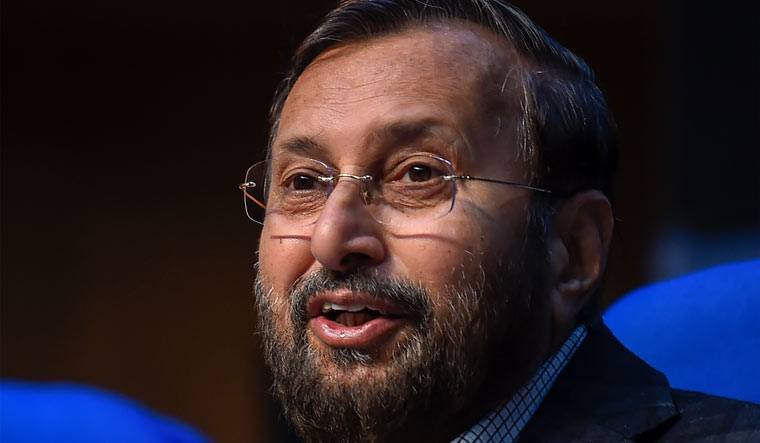Union Environment Minister Prakash Javadekar on Sunday said the pollution problem cannot be resolved in a day and continuous efforts are needed to tackle each of the contributing factors.
Interacting with people during a Facebook Live event, he said the major factors behind air pollution in the country are traffic, industries, waste, dust, stubble, geography and meteorology.
Dust is the major factor behind air pollution in north India, the minister said.
The soil type in north India is alluvial. Therefore, there's a lot of dust, which is the major reason behind air pollution in the region, he said.
"Dust suppressant and water sprinklers are used to tackle it... We have also been asking all agencies, (state) governments and corporations, to close unpaved roads," Javadekar said.
He added, "The pollution problem cannot be resolved in one day. Continuous efforts needed to tackle each of the contributing factors,"
Tackling pollution in Delhi is not just the responsibility of municipal corporations and the city government, the Union Minister said, adding, "The air shed is large and includes parts of Rajasthan, Haryana, Uttar Pradesh."
"After a number of meetings over the years, we have prepared short-term, medium-term and long-term plans and reviewed the progress," he said.
The same approach will be adopted for another 100 cities in India to improve their air quality in the next three to four years, he said.
Javadekar said e-vehicles are becoming popular and over two lakh e-vehicles were being used in India currently, with the government having provided subsidy for around 70,000 of those.
"I myself use an e-vehicle. The e-car is economical... one can travel a kilometer in 70-80 paise. I also drive an e-scooty."
The government introduced BS-VI fuel which reduces vehicular emissions by up to 60 per cent. Metro and e-buses have also been introduced to reduce vehicular pollution, he said.
"Transition to BS-VI standard is another revolutionary step in mitigation of vehicular pollution. BS-VI fuel reduces NOx (nitrogen oxides) emission by 70 per cent in diesel cars, by 25 per cent in petrol cars and reduces particulate matter in vehicles by 80 per cent," he said.
The government is taking steps to phase out pollution-causing power plants by 2022. Zigzag technology has been brought in for brick kilns while industries are using piped natural gas, Javadekar said.
The minister said that the number of 'good' air days has increased from 106 in 2016 to 218 in 2020 for the period between January 1 and September 30.
The number of "poor quality" air days decreased from 156 in 2016 to 56 in 2020 during the corresponding period.
In the last five years, the country's green cover has increased by 15,000 sq km, he added.
Javadekar said people have a big role to play in tackling air pollution and urged them to download 'Sameer' mobile application of the Central Pollution Control Board for monitoring pollution levels in different cities.
He asked people to segregate waste for better waste management, ensure regular maintenance of vehicles, and use public transport and bicycles.








